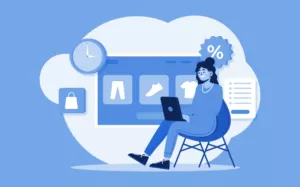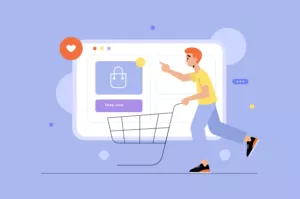Since it provides businesses and customers with unprecedented levels of convenience and accessibility, e-commerce has emerged as an essential part of international trade. But going online to shop comes with a lot of responsibilities, particularly when it comes to protecting customer data. In addition to being required by law, having strong e-commerce security is essential for fostering customer trust and upholding a healthy business image.

Implement Strong Encryption
The first line of defense for e-commerce security is encryption. It guarantees that private data, including credit card numbers and personal information, is safely sent between the client and the server. Through the use of encryption technologies such as TLS (Transport Layer Security), companies may prevent unauthorized parties from intercepting their data. To safeguard online transactions and encrypt data during transmission, you must use HTTPS on your website.
Use Secure Payment Gateways
Payment gateways are essential to the safe processing of transactions. Select trustworthy payment gateways that meet the requirements of the Payment Card Industry Data Security Standard, or PCI-DSS. To safeguard payment information, these gateways make use of cutting-edge encryption and fraud detection technologies. Make sure your payment gateway complies with the most recent security standards by updating and monitoring it frequently.
Update Systems and Software Regularly
It is necessary for security that you keep your e-commerce platform, plugins, and any associated software updated. Updates for software frequently contain fixes for security holes that hackers might use. Establish a timetable for routine updates and keep an eye out for any security alerts about your e-commerce tools.
Use Multi-Factor Authentication (MFA)
Users that apply multi-factor authentication must supply two or more verification factors to get access, adding a degree of protection. This involves demanding more credentials for e-commerce systems than just a password. MFA can prevent key administrative accounts from being hacked and greatly lower the danger of unwanted access.
Implement Strong Access Controls
The least privilege concept should be used to restrict access to sensitive information and systems. Make sure that important information and administrative tasks are only accessible to authorized individuals. To prevent unwanted access, make use of role-based access restrictions and routinely check and adjust access rights.
Conduct Regular Security Audits and Penetration Testing
Frequent penetration tests and security audits assist in finding weaknesses in your e-commerce system before attackers take advantage of them. These checks can reveal infrastructure flaws and offer information about possible security openings. Getting thorough assessments from cybersecurity professionals guarantees the security of your e-commerce platform.
Educate Your Team
Security breaches are frequently caused by human error. Teach your employees the best practices for e-commerce security, such as how to spot phishing efforts, handle passwords safely, and value data protection. Frequent awareness and training efforts can reduce the hazards brought on by human factors.
Create a Response Plan for a Data Breach
Data breaches can happen even with strong security measures. If a breach occurs, you can be sure you can react swiftly and efficiently if you have a well-defined data breach response plan. The procedures in this plan should involve alerting the impacted customers and regulatory bodies as well as locating, containing, and mitigating the breach.
Regularly Backup Your Data
Recovering from a data breach or system failure requires regular data backups. Make sure backups are safely stored and that their integrity is frequently checked. Reliability in backup method implementation reduces data loss and downtime.
Comply with Legal and Regulatory Requirements
E-commerce businesses operating in Australia are required to abide by the Australian Privacy Principles (APPs) and the Privacy Act 1988, which set forth guidelines for managing and safeguarding personal information. Maintaining adherence to these rules shows your dedication to safeguarding customer data while also assisting in avoiding legal issues.
The Bottom Line
One of your main obligations as an e-commerce business is to protect the information of customers. You can protect sensitive data and win over clients’ trust by putting these security measures into place and remaining alert to new threats. Strong security helps you stay compliant with regulations in the cutthroat world of e-commerce, but it also sets your company out as a dependable and trustworthy operator.
To guarantee that your clients have a flawless and secure online buying experience, be knowledgeable, take initiative, and maintain the security of your e-commerce platform.
F8 Media is the leading graphic and website design company on Sunshine Coast. For different kinds of businesses, we specialize in creating dependable, innovative, and security-tight e-commerce websites. We can assist you with either a complete overhaul or a simple website update. To discover more about our services, please contact us right now!



